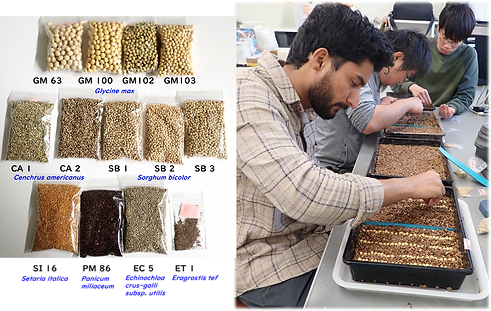

Sep 12, 20251 min read


Sep 12, 20251 min read


Jul 31, 20251 min read

信州大学農学部
大学院 生物資源科学分野 生産環境システム学
食料生産システム科学コース
Division of Food Production Systems
作物学研究室
Crop Science Laboratory
Graduate School of Bioresource Sciences, Production Environment Systems

In recent years, human activities have caused global warming and desertification to become more serious, and frequent extreme weather events are having a major impact on agricultural production.
Mountainous regions are home to magnificent natural scenery that fascinates people, and there are hopes for revitalization that takes advantage of the region's characteristics, such as the production of specialty crops and the preservation of satoyama forests. However, the decline in the number of farmers has had the greatest impact on these regions, with an increase in abandoned farmland.
Millet, sorghum, barnyard millet, and other grains are among the oldest crops, and have been an important food source in Japan since the Jomon period.
Minor grains can adapt to dry soil, excessive moisture, and salt damage, and are resistant to high temperatures. They are also less susceptible to pests and diseases, making them suitable for organic cultivation.
We collect genetic resources of edible crops such as minor grains, soybeans, and rice from around the world, and investigate in detail their reactions to environmental stress, as well as bird and insect damage, to find countermeasures and maximize the productivity of the region.
In addition, we are investigating the characteristics of crops suited to each climate and exploring new cultivation systems that can minimize production costs, with the aim of maintaining small-scale farms and maximizing the appropriate scale.
Our research methodology places emphasis on cultivation experiments that demonstrate various phenomena at the individual and tissue levels of crops.
We seek to clarify the roles of genetic information and chemicals at the tissue and individual levels.
"What is the mechanism behind the robust growth of grains even in difficult conditions such as drought, salinity, flooding, and high temperatures?"
"How can we establish sustainable agriculture in mountainous regions?"
We value the desire to learn and grow, create an environment where students can conduct research in a relaxed and focused manner, and support the creation of true friends.
We aim to develop talented individuals who have specialized knowledge and skills, can overcome the challenges they are given, and can be trusted in any job.
